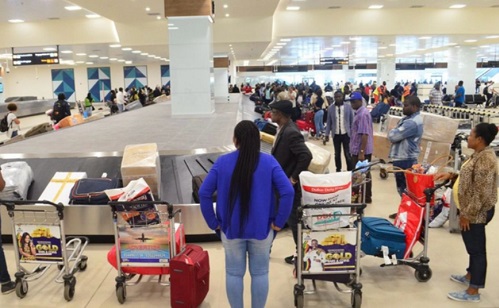Ghanaian residents who travelled and spent at least one night outside the country in 2023 collectively expended an estimated GH₵3.4 billion, according to the Ghana Statistical Service (GSS).
The figure, contained in the newly released Outbound Overnight Visitors’ Report, underscores the growing scale and economic weight of Ghanaians’ international travel, even as policymakers seek to retain more tourism spending within the local economy.
The report, presented by Government Statistician, Dr Alhassan Iddrisu, in Accra on October 30, 2025, forms part of the 2023 Domestic and Outbound Tourism Survey (DOTS), which provides nationally representative data on how Ghanaians and non-Ghanaians travel and spend. It revealed that Ghana recorded a total of 393,305 outbound overnight visitors last year, with the highest volume of travel recorded in the first quarter.
According to the report, most outbound travellers were aged between 25 and 44 years, self-employed and engaged in sales or services-related work, reflecting Ghana’s vibrant informal economy.
“The Greater Accra Region was the leading point of origin, while West Africa remained the top destination, followed by North America and other African countries,” the report noted.
On average, travellers who visited other African destinations stayed seven nights, while those who travelled to North America spent about 13 nights abroad. Visiting friends and relatives accounted for the largest share of trips, followed by funerals and business engagements. Approximately three in every four travellers used non-commercial accommodation, mostly staying with relatives or friends, while hotels remained the most preferred paid option.
The findings also showed that nearly 70 percent of all outbound overnight trips were made by road, highlighting Ghana’s reliance on regional land transport networks. Bus and minivan travel dominated this category, particularly for trips within West Africa.
Self-arranged tours were the most common mode of travel, accounting for nearly 90 percent of total spending. Visitors travelling for business and professional purposes were responsible for the highest on-trip expenditure, peaking at GHS 308.6 million in the third quarter. The report further indicated that transport and shopping were the largest categories of expenditure, with travellers to North America, Asia, and West Africa accounting for most of the total spending.
Dr Iddrisu observed that while outbound travel contributes to Ghana’s international trade, cultural exchange, and regional integration, it also represents a significant outflow of resources that could benefit domestic tourism. “Each cedi spent abroad on hotels, transport, and retail represents untapped opportunity for local enterprise and job creation,” he said, adding that data from the report will guide policy design for tourism-led economic diversification.
The GSS recommended that government and the private sector collaborate to redirect a portion of outbound tourism expenditure into the domestic economy. It proposed tax rebates and internal flight subsidies to encourage domestic travel, as well as the development of affordable local holiday and business packages comparable to regional alternatives.
The report also urged greater investment in service excellence and digital transformation to match international hospitality standards. “By acting on these insights, Ghana can turn outbound movement into domestic momentum,” Dr Iddrisu stressed, noting that the survey supports the National Tourism Development Plan (2013–2027) and the 24-Hour Economy Programme.
According to the GSS, the findings will feed into Ghana’s first Tourism Satellite Account, a globally recognised tool for quantifying tourism’s contribution to Gross Domestic Product and employment. The report said this data-driven approach will ensure that future policies are based on evidence, allowing Ghana to capture more value from its growing tourism sector.
